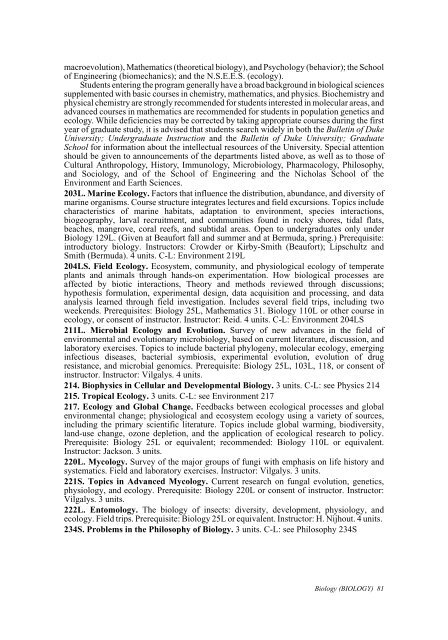2005-06 - Office of the Registrar - Duke University
2005-06 - Office of the Registrar - Duke University
2005-06 - Office of the Registrar - Duke University
You also want an ePaper? Increase the reach of your titles
YUMPU automatically turns print PDFs into web optimized ePapers that Google loves.
macroevolution), Ma<strong>the</strong>matics (<strong>the</strong>oretical biology), and Psychology (behavior); <strong>the</strong> School<br />
<strong>of</strong> Engineering (biomechanics); and <strong>the</strong> N.S.E.E.S. (ecology).<br />
Students entering <strong>the</strong> program generally have a broad background in biological sciences<br />
supplemented with basic courses in chemistry, ma<strong>the</strong>matics, and physics. Biochemistry and<br />
physical chemistry are strongly recommended for students interested in molecular areas, and<br />
advanced courses in ma<strong>the</strong>matics are recommended for students in population genetics and<br />
ecology. While deficiencies may be corrected by taking appropriate courses during <strong>the</strong> first<br />
year <strong>of</strong> graduate study, it is advised that students search widely in both <strong>the</strong> Bulletin <strong>of</strong> <strong>Duke</strong><br />
<strong>University</strong>; Undergraduate Instruction and <strong>the</strong> Bulletin <strong>of</strong> <strong>Duke</strong> <strong>University</strong>; Graduate<br />
School for information about <strong>the</strong> intellectual resources <strong>of</strong> <strong>the</strong> <strong>University</strong>. Special attention<br />
should be given to announcements <strong>of</strong> <strong>the</strong> departments listed above, as well as to those <strong>of</strong><br />
Cultural Anthropology, History, Immunology, Microbiology, Pharmacology, Philosophy,<br />
and Sociology, and <strong>of</strong> <strong>the</strong> School <strong>of</strong> Engineering and <strong>the</strong> Nicholas School <strong>of</strong> <strong>the</strong><br />
Environment and Earth Sciences.<br />
203L. Marine Ecology. Factors that influence <strong>the</strong> distribution, abundance, and diversity <strong>of</strong><br />
marine organisms. Course structure integrates lectures and field excursions. Topics include<br />
characteristics <strong>of</strong> marine habitats, adaptation to environment, species interactions,<br />
biogeography, larval recruitment, and communities found in rocky shores, tidal flats,<br />
beaches, mangrove, coral reefs, and subtidal areas. Open to undergraduates only under<br />
Biology 129L. (Given at Beaufort fall and summer and at Bermuda, spring.) Prerequisite:<br />
introductory biology. Instructors: Crowder or Kirby-Smith (Beaufort); Lipschultz and<br />
Smith (Bermuda). 4 units. C-L: Environment 219L<br />
204LS. Field Ecology. Ecosystem, community, and physiological ecology <strong>of</strong> temperate<br />
plants and animals through hands-on experimentation. How biological processes are<br />
affected by biotic interactions, Theory and methods reviewed through discussions;<br />
hypo<strong>the</strong>sis formulation, experimental design, data acquisition and processing, and data<br />
analysis learned through field investigation. Includes several field trips, including two<br />
weekends. Prerequisites: Biology 25L, Ma<strong>the</strong>matics 31. Biology 110L or o<strong>the</strong>r course in<br />
ecology, or consent <strong>of</strong> instructor. Instructor: Reid. 4 units. C-L: Environment 204LS<br />
211L. Microbial Ecology and Evolution. Survey <strong>of</strong> new advances in <strong>the</strong> field <strong>of</strong><br />
environmental and evolutionary microbiology, based on current literature, discussion, and<br />
laboratory exercises. Topics to include bacterial phylogeny, molecular ecology, emerging<br />
infectious diseases, bacterial symbiosis, experimental evolution, evolution <strong>of</strong> drug<br />
resistance, and microbial genomics. Prerequisite: Biology 25L, 103L, 118, or consent <strong>of</strong><br />
instructor. Instructor: Vilgalys. 4 units.<br />
214. Biophysics in Cellular and Developmental Biology. 3 units. C-L: see Physics 214<br />
215. Tropical Ecology. 3 units. C-L: see Environment 217<br />
217. Ecology and Global Change. Feedbacks between ecological processes and global<br />
environmental change; physiological and ecosystem ecology using a variety <strong>of</strong> sources,<br />
including <strong>the</strong> primary scientific literature. Topics include global warming, biodiversity,<br />
land-use change, ozone depletion, and <strong>the</strong> application <strong>of</strong> ecological research to policy.<br />
Prerequisite: Biology 25L or equivalent; recommended: Biology 110L or equivalent.<br />
Instructor: Jackson. 3 units.<br />
220L. Mycology. Survey <strong>of</strong> <strong>the</strong> major groups <strong>of</strong> fungi with emphasis on life history and<br />
systematics. Field and laboratory exercises. Instructor: Vilgalys. 3 units.<br />
221S. Topics in Advanced Mycology. Current research on fungal evolution, genetics,<br />
physiology, and ecology. Prerequisite: Biology 220L or consent <strong>of</strong> instructor. Instructor:<br />
Vilgalys. 3 units.<br />
222L. Entomology. The biology <strong>of</strong> insects: diversity, development, physiology, and<br />
ecology. Field trips. Prerequisite: Biology 25L or equivalent. Instructor: H. Nijhout. 4 units.<br />
234S. Problems in <strong>the</strong> Philosophy <strong>of</strong> Biology. 3 units. C-L: see Philosophy 234S<br />
Biology (BIOLOGY) 81









